

Subscribe now to get the Vampire: The Masquerade – Bloodlines 2 issue and a D&D poster pack-in!
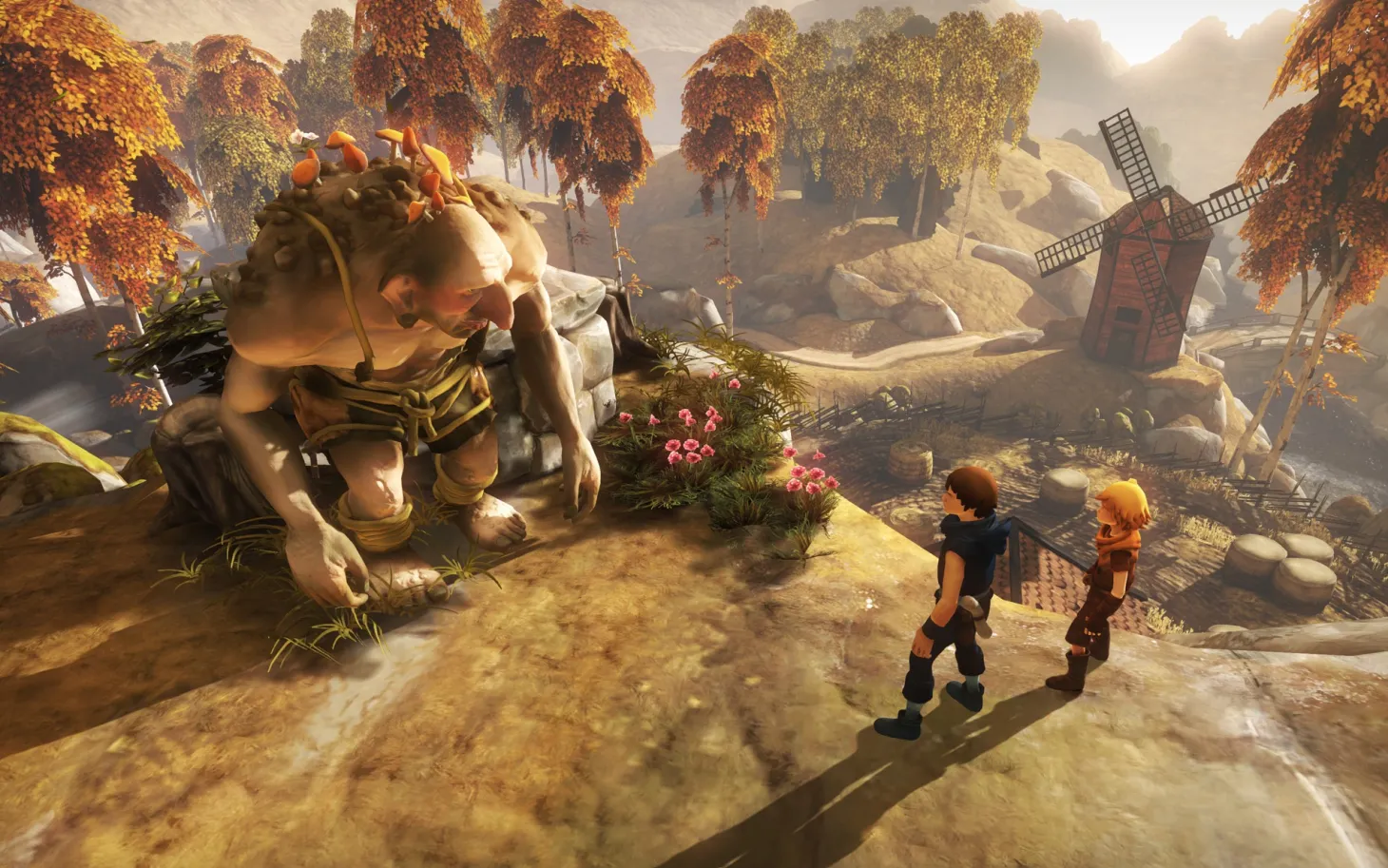
Josef Fares never made a video game before Brothers: A Tale of Two Sons, but you wouldn’t know that by playing the game. It feels like the veteran effort from a designer with a story that he is determined to tell. Fares’ history is in filmmaking, but he has always been fascinated by interactive storytelling and video games.
In our interview below, Fares talks about pushing past the skeptics to create the game, how he hopes to one day meet with the creator of Ico and Shadow of the Colossus, and how his childhood tragedy lead to one of the game’s most emotional moments. It may go without saying, but just in case, there are spoilers below.
You can also check out some highlights from our recorded interview by listening to the audio at the bottom of the page.

Where did the idea for the game come from? Did it start from the innovative control scheme? Or did the game build around the story?
No, no, no. The first thing that happened… just a little bit of my background. I normally work as a film director. This is actually my first game that I directed. In Sweden I am kind of well-known as a director, but in every interview I've talked about games and how much I love games, because I am a hardcore gamer. I’ve owned everything.
It just happened that one of the guys I knew had a school where he had some students, and he asked me, “Do you want to do something during the summer, like a prototype?” And then I got so pumped up for it and thought, “Wow! This is a dream come true.” This has always been a dream of mine to make a game. So I came up with pretty much the foundation of Brothers, like controlling with two sticks and how it was going to end. That was actually the first thing I came up with.
I didn’t realize you were a filmmaker. I thought you worked for Starbreeze.
There were many skeptical voices when I came in. And I didn’t have any experience in gaming at all. I think as soon as people spoke with me, they realize how passionate I am, how much I know about games, how many games I’ve played, and I think they changed their minds in the first ten minutes. But I have been having a lot of skepticism both in-house and outside, as well. I am even more happy now that this game is getting this great reception. It makes it a lot easier to make a second game.
How long was Brothers in development? When did you start coming up with the ideas for it?
The ideas [began] like three years ago, but I started at Starbreeze and I met the CEO there and told him, “I have a great idea that I think you should love,” and I think at that time they were changing studios and they were tired of doing others’ IP. They wanted to do their own IPs. I paused everything and I went to Starbreeze and I started to work there two years ago. This was a full-time job. I was there 24-hours a day. This is a really passionate project for me. This really meant so much to me, and I really, really believed in the game, as well. You could say two years.
If I had not known Brothers was a Starbreeze game up front, I never would have guessed that it was the developer.
That’s what many say. They’re really happy with the game and how the reactions are. Of course many people – because I came in as a creative and game director with no experience at all – it’s kind of a leap so I understand that some people maybe have felt like, “Okay, what’s he doing here?” That’s understandable.
How realized is the world of Brothers? Obviously, a lot of it is left intentionally ambiguous to great effect, but I was curious if you had backstories for the tribesmen and the giants, etc.
I love the interactivity of gaming, and that goes for everything. Both visually and… that’s also one of the reasons why the language is not understandable because I want the player to start to figure things out themselves. I don’t like to talk about what’s going on exactly. In my mind I have all the details pretty much, but it’s better left up to the player to kind of figure out, “Okay, what’s happening.” I like to play with these curious things so the player is involved all the time. That’s part of the reason.
What I can tell you is, like that path of the giants, there is a theme about death and life throughout the whole game. I don’t know if you saw that, but they are part of that theme. The particular history of why they’re there and what happened is nothing I want to talk about.
I didn’t expect you to go into detail. I don’t think I would want to know, honestly.
I think you need to have those things to get a logical idea of what’s going on in your head, but it was also important to not give too many details. I’m sure if you look closely you will see. There are many stops in the game that unveil or reveal some stuff here and there.
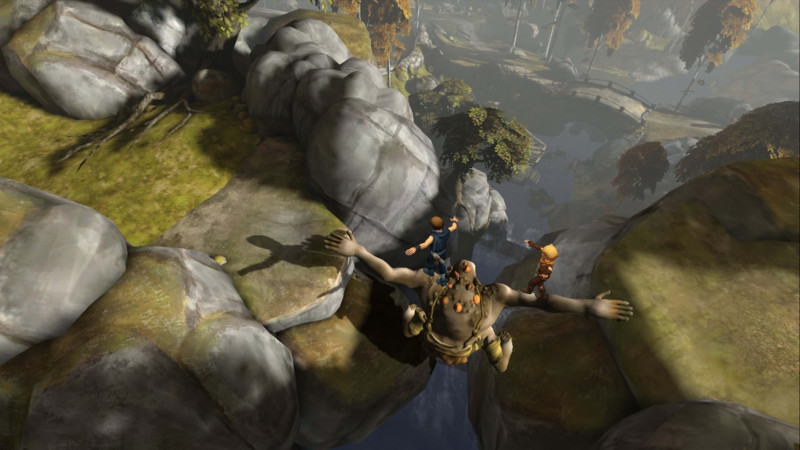
Did you create a language or is it mostly gibberish? And do you think Brothers would have worked as a silent story with no dialogue whatsoever?
Actually, the language is inspired from my own language. I am originally from Lebanon, so I took my Arabic language just to get a base. Creating a gibberish language from the ground up is very hard. When you take a language that is there and you have all the accents – it feels right. I told the actors, “This is what you are saying,” and I wrote to them this and that and it sounds like a language. It wasn’t totally made up. It was made up in many senses, but it is also very inspired by my own language.
I think the game would have been hard to tell if they didn’t speak because I think it would have felt a little bit off, because the emotions they go through are emotions that many people can relate to today. If they were too silent the player would not connect to them as many seem to do, actually. So, no, I don’t think silence would be better. But that’s part of the interactivity that I like about games, the player can read the body language and figure out what they could say. Funnily enough, people are understanding the game and the story quite well so, it seems like we’ve succeeded there.
What were some of the unanticipated challenges that you ran into when you were making the game?
It was insane. Because not many have tried this mechanic before, we were in uncharted territory. The way of designing the puzzles; how would we do that? What speed should the characters walk? But the most insane part was the camera, because when you control two characters with one stick and you have the camera, how would you solve it? I mean, now I’m happy that everybody seems to like Brothers’ camera, but in the beginning it was crazy. We tried so many different things. If you look closely, if you separate the brothers a lot and go around with them, the camera would always try to put the right brother on the right side, but if you’re close it doesn’t do that anymore. In the beginning, we tried to have the camera always put the right brother but then the camera was spinning around all the time. The code behind the camera is insane. It’s really crazy. That was the most challenging part.
That’s kind of a surprise to hear. I wouldn’t have guessed it was the camera.
Yeah, but that’s the good thing, because people are not reacting to it, which is proof that we actually succeeded somehow. We have a guy who was specifically working on the camera all the time because that was extremely challenging. And also the amount of content we had in the game. There’s a huge amount of animation and variety in the mechanics. With so many different mechanics, the game tends to break down a lot easier than if you had one mechanic that you repeat all the time. But just to make it clear, the team that made Brothers is kind of a fresh team. It is new guys at Starbreeze, so it wasn’t a very experienced team. So [when you] see it from that perspective, it’s even more impressive from what we have done with this game. This was my first time and many, like half the team, it was their first game.
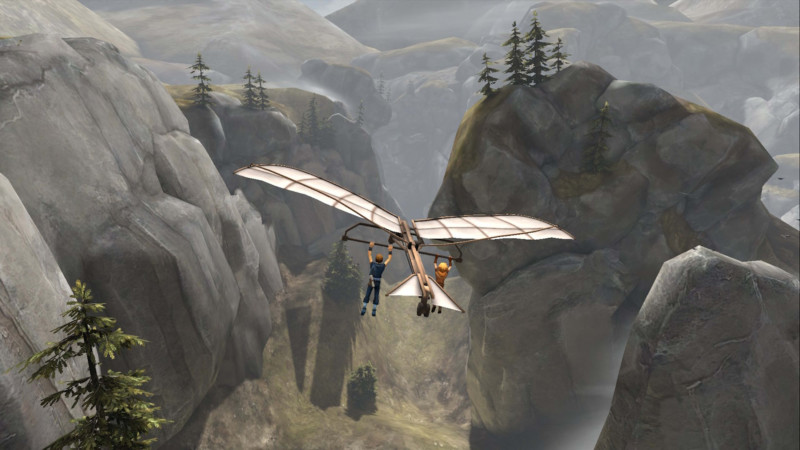
The game sort of seems like it is built for cooperative play. Was that ever a consideration?
Not at all. There were many voices in and outside that were saying, “You should do a co-op game,” but I would rather cut my hands than do that. The whole foundation of the idea is that you connect with your left hand to the bigger brother and right hand to the little brother. The idea – now that you’ve played it through – that you actually lose one physical hand and stop using it, that feeling that you’re missing something. There’s also that point where the little brother is on the right stick, because normally you control a character with the left stick, so once you lose the left stick, it’s even more odd that that hand is gone. Also, with the ending that you get the strength from the big brother to go on with your life, that’s also part of it.
It was extremely important to always let the player play themselves. That’s why I say sometimes it’s a single-player co-op game. From a puzzle and challenge perspective, some of them we did first were too hard. It was very important to me to keep the pace going. Every puzzle and challenge needed to be quite soft and not too hard, but they were also designed to be more comfortable when controlling two rather than one. As much as possible, we tried to make it more comfortable for one player to control two brothers rather than two players controlling them. A good example, for instance, is with the rope sequence or when you carry a log. Another example, when you tie your shoe [by] yourself you feel comfortable. If you do it with someone else, it’s going to feel a bit weird. That was how we approached this game. For me it was very, very important that the player controls two characters. We did some early tests because many people told me that this hasn’t really been tried out before. There are some games that have tried it a little bit, but not as far as we were doing it in Brothers.
We did some early tests with new gamers, and we gave them Brothers and an FPS and they were totally lost playing the FPS, but Brothers at least they could control them and could see what was going on. You know how people are when they don’t play FPS – they look up and down and everything is crazy. It’s kind of a learning curve. I can understand that some players are feeling a bit frustrated by controlling them, but I think in the end when you play it through you'll understand why it was important that you control them simultaneously.
I’ve heard of some people sharing a controller. Is that something you would discourage?
Definitely. That’s like almost putting a different soundtrack on a movie I’ve made. It’s like destroying the game, actually. Maybe you can do it after you play it once just for fun, but I, the man behind the game, haven’t played it with someone else like this. I really believe that you destroy – well, not destroy, but you don’t get the full effect of the experience if you don’t play it alone.
You were tweeting recently, trying to make sure people play the PC version with a controller, do you think part of the game is lost if you use a mouse and keyboard?
Oh, definitely. It’s like ruining the experience even more if you don’t play with a controller. We have a big sign on PC that says “This game is designed for controllers.” I really hope that people see that clearly and understand it has to have a controller. It’s so important for the experience itself and how the puzzles and challenges are designed, what happens in the end. I really hope people are getting that.
I’m curious what the play testing was like. Were people disappointed that there wasn’t co-op? They were trying to push you towards it?
Definitely, publishers were pushing it. But I was like, “That would never happen.” As I told you, when I decide something it needs to happen. Our publisher was great, they didn’t fear anything. We talked to Microsoft and of course they were like, “co-op, co-op! Co-op sells! Co-op is good!” they have kind of a checklist. When I try to explain to them why, some people understood, some didn’t. That would never happen though. I would never change it to a co-op game. That would never happen.
Did you have to argue? Was it difficult? Or did they just back off?
They both backed off, and they understood. The good thing is my team and our CEO believed in the game, so that was the most important stuff. Once you explain the things I’ve told you now, the connection between the player, the left hand and the right hand, and what was going to happen in the end, most of them actually got it. Especially those who actually like games and enjoy playing games. There are some people, publishers – you probably know it better than me I guess – you know how many games out there have been destroyed by people who really don’t know anything about games making these weird decisions. It’s really sad, actually. I understand that for publishers it’s all about the money somehow, but we’re not making boxes of wood or something. We’re working with art here. The economy and the art have to meet in the middle somehow. It just can’t be about the money.
I’ve done six film features in Sweden, which have become very, very big. I’m used to working and delivering with big budgets. There has to be a mutual respect there somehow.
That’s encouraging to hear.
It looks very promising to me to do more games. If I make more games, I have many more really cool ideas – I know that when people play them people will go, “Wow, I haven’t thought of this before.” For me, from a creative perspective, there are so many things to discover [with] how to tell a story. Many thought because of my background as a filmmaker – I really appreciate Heavy Rain and The Walking Dead, but for me they are too close to a film experience. I remember putting the controller on the table most of the time and looking, and looking, and looking. I am a big fan of the Kojima games, but when a cutscene is twenty minutes, I think that is a bit too much. I believe there are other ways of telling stories in games. I came up with an idea when I was playing Walking Dead, just from a perspective of how I felt. I still appreciate the game, don’t get me wrong, it’s just not the future of gaming if you ask me.
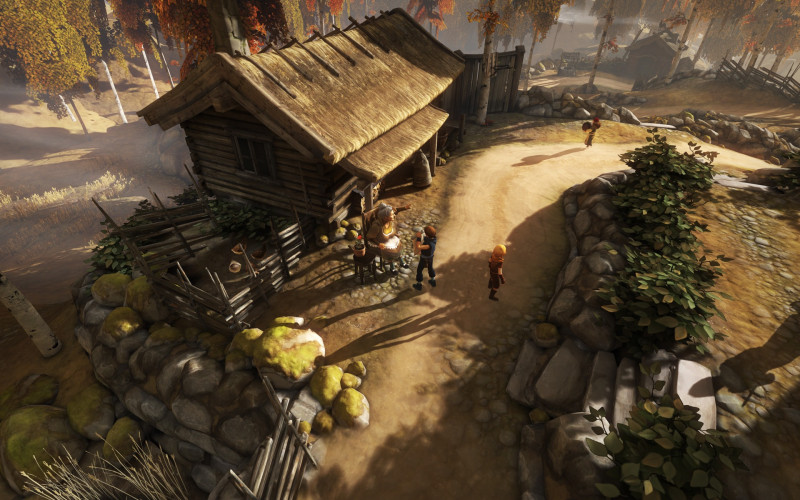
You mentioned Kojima, and I think there are some obvious Ico influences in Brothers. I was wondering if you could talk about your influences for Brothers in general. I was wondering if the Spider battle near the end of the game is a reference to LIMBO? Is the flying creature a Last Guardian homage? Maybe I am reading too much into it.
Maybe it is. The spider in the beginning when you go left or right is an homage to Another World, which is one of my favorite games. Actually, I met Eric Chahi at an E3 two years ago, the creator of that game. He’s a really nice guy. That was actually before I started working on making my game. I told him I was going to start and make my first game. It was very nice. I also met Peter Molyneux. I actually met him again, and I got him to play my game and he was really, really impressed. I thought that was really cool.
I would say that most of the inspiration comes from my love of the top-down RPGs, especially the ones from the Super Nintendo era. You remember Chrono Trigger, Zelda – Secret of Mana is one of my favorite games. I love Lufia one and two, Soul Blazer – all those games are top down. I think that was the main reason why Brothers is top down. Brothers was also my urge to try and do something different. We didn’t have a game designer on Brothers. Normally you have a game director, a game designer, you have a creative director – I was the creative and game director and the designing was me and of course the team, but I was always trying to do something different. In Brothers, it was important to change the experience all the time, to come up with something new. For example, if you take the puzzle where the Brothers climb on each other and try to pretend to be this god? The amount of content animation required just to be used there was really crazy from a game perspective. Many in my team were kind of laughing at me because it was like you can’t do this. You can’t change the game mechanic all the time. And my answer was always, “Why not? Why not?” We just wanted to go the opposite all the time.
Of course, we reused some stuff, like a little bit of the climbing and when they help each other up, and some swimming, but that was also I believe part of the story because then you understand it in the end when you have to do it yourself. Now you’re able to do it alone. That was also one of the things that was there because you don’t have to be two players to accomplish what one could. That was very important.
I don’t know if I’m changing the subject. I could talk about this for hours. I can talk probably to you about games for so long.
Have you tried to reach out to Fumito Ueda (creator of Ico and Shadow of the Colossus) at all? Have you tried to give him a code to play the game?
I wish I could, I kind of understand the pressure he has on him right now. I wish I could meet him and talk to him because I feel that in the film industry my first feature became a huge success and I felt the same doing the second one. This pressure of how will I do and so on and so on. I just think that he needs to relax and trust his gut feeling and just go with that. But I know it’s hard. I think he is having a big problem with himself right now, trying to deliver something. Because people have insane expectations of him. It’s no wonder he has – I can imagine that he can’t sleep during the night. This project [The Last Guardian] has been, I think, his ambition and has been going on so long. But really, he doesn’t have to worry because what I’ve seen of the game from trailers, it looks amazing. So I really hope this game comes out. I think it will, also.
So you just want to leave him alone and let him do his thing?
Yeah, I would love to meet him actually and just sit down and talk to him. That would be great. I think we would have really interesting discussions about games and stuff, if he would be interested.
I wanted to ask you about the Achievements. They’re atypical, because you can get through the whole game and not get a single achievement. Do you dislike Achievements? What was your reasoning behind that?
Yes. I dislike them because I think that… most of it’s like collect this and do this, do that, but I think Achievements should be something achieved, hopefully something that connects with the story itself. I would have wanted to do more stuff with the Achievements, but the idea of Achievements in Brothers was to have themes that connected with the story, being outside, about death, about loneliness, all that stuff that we tried to put in. But they need so much work for every Achievement. Once again, “Why are we doing so much work for something that people are probably going to miss?” But I said, “It’s because it’s really nice and it goes with the stories.” So that was very important, from the beginning if they wanted that, they were going to have very, very different Achievements and not the typical collect this and that.
During the final puzzle of the game, where you have to swim by yourself – that is a really powerful moment. You said it was one of the first things you came up with. Can you talk about that puzzle a little bit more?
I think that pushing the button for the other brother was actually something that came up later. I remember when I came up with that, I couldn’t sleep that night, because I was so pumped up thinking, “I have to go to the team and tell them this.” I remember even that day when I came into the office, I’m like, “Okay this is gonna…“ and I was so pumped up and when I told them this they were like, “Wow, this is really cool.” Because it was such an "ah-ha!" moment. From the first moment I came up with one brother dies and you’re alone and you have to go through those obstacles yourself, but by pushing the button and getting the strength from him, that was such a hard moment, and it felt so good. Because it is the essence of the whole game itself and what I’m happy about is that even people who have felt that the controls are a bit frustrating, or even if they don’t really like the whole game, they still appreciate what happens in the end and that makes me very happy.
I was actually a bit afraid and I even told my team, at the ending part, “Listen, if nobody gets the game now they will understand it in five years.” I know I’m being cocky here, but I know that that moment was very, very, very important and it was very important for this game and I’m so happy that people are reacting to it. We talked before, will people understand this? Should we help them somehow? We tried as much as we could, both in the sound and a bit in the vibration, and the controls, to help the player a little bit, but I think there is a point that some people… it takes a while until they figure it out, because it’s a part of the high experience somehow.
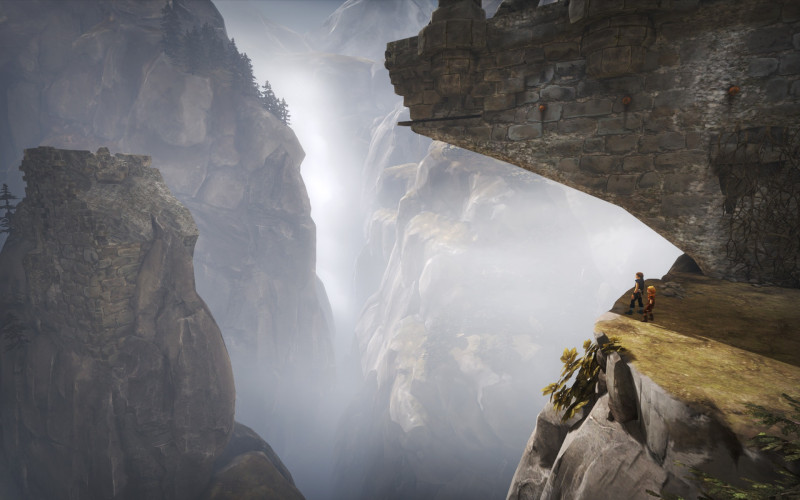
Can you talk about the ending a bit. It’s a somber ending. Was there a fear in having such a sad ending? Or do you think it was necessary for the growth of the younger brother?
Definitely. I feel the same way, it’s kind of an optimistic ending in many ways. You have to go on, get a life and stuff. Of course it’s a sad scene and I know many people have cried at the ending which, it somehow makes me happy. Of course, at the same time, I feel that there is an optimistic ending, and we see that. I don’t want to talk too much about it. I don’t know if you interacted with everything. I think a lot of people have missed a lot. There’s huge amount of interactive stuff. If you look closely, with the brother, the little brother especially in the beginning, he’s a bit – In the beginning he’s a bit childish and mischievous. You see as the game goes, he grows more, and more, and more, and matures throughout the game. And there is actually the one flower in the beginning of the game, if you push with the little brother he will toss it down and break it. I don’t know if you did that in the beginning.
No, that’s something I missed.
If you do that in the beginning, in the end, in the final scene when you go up before you go to the front, there’s a similar flower just outside the father and if you go to that, you will smell the flower as his big brother did. So there are things like that.
The game is about the little brother, for me. He’s the one that’s transformed from a boy to a mature man, you could say. He grows to this. And there is an optimistic look in his face in the end. He still has his father, and he’s ready to go on with his life. It’s in many ways a very personal game to me. When I was in Lebanon – this is very private but, anyway – when I was young, like seven years old, I really wanted a younger brother, and my mother, she lost a baby in birth. And actually, she gave him to me to bury him. So I actually pretty much did that scene that is in the game, which is extremely powerful for me as well.
As I playing I was curious if the themes of death and the message of moving on was a product of personal experience or loss.
Yeah, definitely it is, but of course he was just a newborn, but still I was very young. In a country like Sweden or America, they would go like, “Who would let a child…?“ but in those days there was war. But of course, it was a very powerful moment that’s been with me throughout my whole life.
What feedback has meant the most to you?
Definitely the ending and the moment you’re talking about. Pushing the big brother button. How people are like, “Wow.” That was one of the biggest moments in the game. That makes me really happy. I’m also happy about the ending sequence because, once again, the interactivity was so important. I really wanted to make that an interactive experience. You actually carry your brother into the hole. I’m extremely proud that people are getting that. That’s my proudest moment.
We talked about that moment of swimming without your brother, but another really touching and powerful moment is burying your brother. I can’t think of any comparable experience in a video game that I’ve had like that.
Of course when we did it there was a lot of bugs and stuff like that. But once we finished it, it was like “Whew!” It felt so good to nail that scene down.
Thanks so much for your time. I’m really excited to see what you plan on working on next.
Yeah, I wish I could tell you. I’m quite sure you’re going to think it’s interesting.
For more on Brothers: A Tale of Two Sons, you can read our review here. Thanks to interns Mike Trinh, Katie Seville, and Isaac Perry for transcription help on this feature.